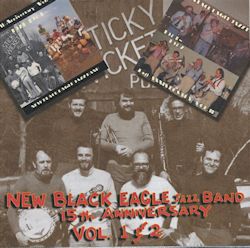Volume 1
1. Joe Avery’s Piece
2. My Journey to the Sky
3. Gatemouth
4. Red Wing
5. Breeze
6. Coal Black Shine
7. Love Song[s] of the Nile
8. Original Jelly Roll Blues
9. Coal Cart Blues
10. Mabel’s Dream
11. Saturday Night Function
12. Haarlem Bound
13. Magnolia’s Wedding Day
14. Working Man Blues
Playing time: 75m. 48s.
Recording locations and dates vary from Nov. 14, 1971 through Nov. 1, 1978. All details given in the CD booklet.
Tony Pringle – Cornet & leader (all tracks)
Stan McDonald – Clarinet & soprano sax (tracks 1-12)
Stan Vincent – Trombone (all tracks)
Bob Pilsbury – Piano (tracks 1-3, 5-14)
Peter Bullis – Banjo & manager (all tracks)
Eli Newberger – Tuba (tracks 1-9, 13-14)
C. H. “Pam” Pameijer – Drums (all tracks)
Terry Waldo – Piano (track 4)
Butch Thompson – Clarinet (track 5)
Don Kenney – String bass (tracks 10-12)
Brian Ogilvie – Clarinet (tracks 13-14)
Volume 2
1. Kinklets
2. The Mooche
3. You’re Not the Only Oyster in the Stew
4. Lead Me Savior
5. Terrible Blues
6. Harlem Fuss
7. Chimes Blues
8. Dusty Rag
9. If You’re a Viper
10. Kansas City Stomps
11. Michigander Blues
12. Bogalusa Strut
Playing time: 69m. 15s.
Recording locations and dates vary from Sept. 7, 1982 through Jan. 24, 1987. All details given in the CD booklet.
Tony Pringle – Cornet, leader (all tracks) & vocal (track 9)
Hugh Blackwell – Clarinet, soprano, & alto saxes (tracks 1-9)
Stan Vincent – Trombone (all tracks)
Bob Pilsbury – Piano (all tracks) & vocal (track 3)
Peter Bullis – Banjo & manager (all tracks)
Eli Newberger – Tuba (all tracks)
C. H. “Pam” Pameijer – Drums (all tracks)
Billy Novick – Clarinet, soprano, & alto saxes (tracks 10-12)
This double-disc set was originally issued on two tape cassettes to mark the band’s 15th anniversary in 1987 and is now part of the CD reissue
series currently under way. The performances were culled from a variety of gigs during these first fifteen years, with the result that on a few of the
dates substitutes are to be found; but the band has had a remarkably stable personnel for most of the years of its existence, the only chair seeing a bit
of turnover during the early years being the reeds, although Billy Novick has held that chair since 1986. Three of the tracks on disc 1 gave a foretaste of
what was to come after Eli Newberger left the band in 2001 since his tuba was replaced by string bass.
Perhaps “variety” would be the byword for the contents of these two discs. There is great variety in the locations where the band performed, running from
concert settings in academia (Fontbonne College, St. Louis, MO; York College, York, PA) to small, intimate venues (Goldenrod Showboat, St. Louis, MO;
Sticky Wicket Pub, Hopkinson, MA) to television studios (WGBH, Boston, MA) to recording studios, to you-name-it. Approximately half of the tracks come from
live performances, the rest from studio recordings.
Likewise there is much variety in the band’s repertoire: rags (Kinklets, Dusty Rag—each a whole band effort, not just a piano solo)); marches (Joe Avery’s
Piece, Bogalusa Strut); hymns and spirituals (My Journey to the Sky, Lead Me Savior); novelty numbers (You’re Not the Only Oyster in the Stew); “reefer”
songs (If You’re a Viper); and, of course, the blues, stomps, and pop songs that also comprise a jazz band’s book. All are to be found here, and all are
given fine renditions.
The band’s mastery is also evidenced in their ability to take on challenging tempos and, almost invariably, do so without faltering. Perhaps there is a
small glitch in a couple of the breaks on the brisk Harlem Fuss, but if so the recovery is so rapid that they are barely detectable. The “surprise” ending
given to the piece is a delight. Elsewhere one encounters superb dynamics—this is not a band that plays loud and louder but can drop to a whisper where
needed.
Every track has its moments. One that struck me particularly was the nice Latin tinge, so beloved of Jelly Roll Morton, in the backing given in his
composition Original Jelly Roll Blues—even an “Olé” is thrown in behind clarinet solo for good measure. Piano and banjo play straight choruses,
then the drums lay down a habanero rhythm behind the tuba solo.
Another was the drama of Working Man Blues. Pamiejer’s woodblocks on the opening ensemble choruses of the tune were very
effective, followed by tom tom accents leading to the breaks, all immaculate—here and throughout the tune—and Pamjeijer continues to give tasteful backing
to the others all the way. After the clarinet solo, Pringle’s fine, subdued muted cornet and Vincent’s brash, muted trombone solos heighten the tension,
leading to Pilsbury’s single note piano phrasing at the beginning of his solo, which is striking, followed by some block chording. After this is an
ensemble chorus leading up to a duet of an expressive solo by the tuba with sympathetic banjo backing, the others having dropped out. This duet is
terminated by a guttural gliss from Vincent’s trombone which leads into the out choruses, ending with a ritard that concludes with a minor chord—all highly
dramatic stuff.
To make a long story short, what these two discs add up to is a typical New Black Eagles outing, one that is sure to please the band’s myriad fans and,
along the way, create new ones. That is what the band was doing thirty years ago when these tracks were recorded and what it is still doing today—over and
over. The reissue series will continue, with two more double CD sets in the works, these being reissues of tape cassettes originally commemorating the 20 th and the 25th anniversaries.
At the band’s web site <www.blackeagles.com> one can obtain more information.
Bert Thompson
